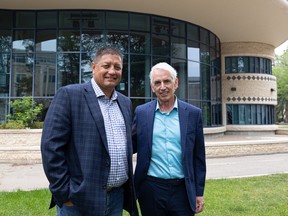New U of S policy requires proof for Indigenous-specific roles
The policy is the first of its kind after several Canadian universities faced scandals of academics falsely claiming Indigenous ancestry.

Article content
A new University of Saskatchewan policy aims to crack down on students and academics who falsely claim to be Indigenous.
The school is the first university in Canada to require students and faculty to provide documentation proving membership to an Indigenous community when applying for any job or opportunity that is reserved for Indigenous peoples.
University president Peter Stoicheff said the school believes its previous policy of trusting people to be honest was “no longer sufficient or respectful.” He said the policy would take effect immediately and be phased in gradually over the next two to five years.

“Verification will not be determined by us, by the university internally. Instead it’s going to be determined with the guidance and support of external Indigenous communities and governments,” Stoicheff said.
In recent years, Canadian universities have seen a series of incidents where high-profile academics have had their claims of Indigenous ancestry thrown into question, including one high-profile case at the U of S.
A CBC investigation published in October 2021 found that Dr. Carrie Bourassa, a star health researcher, could not substantiate her claims of Anishinaabe, Métis and Tlingit ancestry. The case received international media attention, and Bourassa has since left the U of S.

Stoicheff said the school, though, had been mulling such a policy before that incident. Universities across Canada have expanded recruitment of Indigenous staff and scholars in recent years in response to recommendations from the Truth and Reconciliation commission.
“I think the situations we have faced in the recent past have accelerated our process and sharpened our intent,” Stoicheff said.
Identity versus membership
The policy was drafted by a 29-member task force the U of S struck in January including Indigenous academics, administrative staff, students, Elders and community leaders.
The group decided the school’s policy could not and would not try to determine whether someone is Indigenous.
Instead, U of S Provost Airini said it aims to verify that a given community claims an applicant as a member. Airini, who uses only one name, said Indigenous communities, not the school, will decide what that proof looks like.
Saskatoon Tribal Council Chief Mark Arcand, a member of the task force that drafted the policy, argued that was the most appropriate way to make sure opportunities for Indigenous academics and students — like scholarships, jobs or placements — go where they are intended.

“At the end of the day, it comes down to the community actually verifying who their citizenship is,” Arcand said.
Stoicheff said most existing staff and students who serve in positions or have received scholarships intended for Indigenous people will not have to prove membership.
The policy says, though, that it may apply retroactively to faculty and students when “there is reason to question the authenticity of that claim” or when “the absence of verification could be otherwise contrary to the principles recognized in this policy.”
There is acknowledgement the process will not be simple. Many First Nations people do not hold Indian “status” under federal law. Other people may have Indigenous ancestry, but do not necessarily have documentation to prove it, owing in part to the legacy of colonization.
Airini said a standing committee would be struck to support the policy’s implementation and acknowledged the work would be difficult.
“We could either be that boat that’s been built and stays in a safe harbour, or we could be one that’s going to go outside beyond the breakers. We’re saying that’s what this policy makes possible, for us to get on board and start moving forward.” Airini said.
zvescera@postmedia.com
twitter.com/zakvescera
The news seems to be flying at us faster all the time. From COVID-19 updates to politics and crime and everything in between, it can be hard to keep up. With that in mind, the Saskatoon StarPhoenix has created an Afternoon Headlines newsletter that can be delivered daily to your inbox to help make sure you are up to date with the most vital news of the day. Click here to subscribe.








Postmedia is committed to maintaining a lively but civil forum for discussion. Please keep comments relevant and respectful. Comments may take up to an hour to appear on the site. You will receive an email if there is a reply to your comment, an update to a thread you follow or if a user you follow comments. Visit our Community Guidelines for more information.